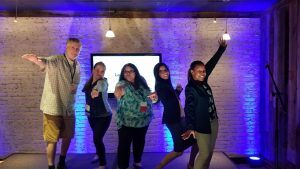“The Impact Collaborative Summit and process provided an important place for our Mindful Engagement Project team, led by Sue Schneider, to develop their concept and determine next steps. The ability to access expert key informants and resources, both pre- and post-summit, galvanized the team, enabling them to fully conceptualize and explore the potential of the project in a very short time. The pandemic has created many challenges for communities, and having this opportunity available in a virtual setting was incredibly important to moving the team’s work forward.”
– Ashley Stokes, DVM, PhD, MBA – Associate Vice President of Engagement and Extension, Colorado State University
Mindful Engagement is a newly conceptualized project from Colorado State University (CSU), led by Sue Schneider, an Extension agent in Family and Consumer Sciences and Community Development based in Fort Collins. The team also includes CSU Extension’s Lisa Auer, who serves as the site coordinator for the Larimer County Family Leadership Training Institute (FLTI); and Tony Lynch, a community champion who is a member of the 2020 FLTI cohort. The team was one of 25 groups from across the country that participated in the first ever virtual Impact Collaborative Summit, held in October 2020.
The Mindful Engagement project will leverage community champions seeking to affect social change, through mindful engagement practices geared toward individual and collective compassionate resilience. The community champions are alumni of a 20-week Family Leadership Training Institute (FLTI). FLTI seeks to build individual and community capacity, bridge the gap between local residents and decision makers, and encourage the co-creation of programs and policies that reflect the diversity of community voices.
The Mindful Engagement Team partnered with the eXtension Foundation through the Impact Collaborative Summit. Teams participating in the Summit were provided one-on-one coaching by the Impact Collaborative’s network of Innovation Facilitators. Innovation Facilitators are Cooperative Extension professionals who are trained to provide individuals with a new way of looking at program and project development, using the Innovation Skill-Building Experience (ISBE). ISBE is a methodology that helps new and existing programs across states and institutions identify gaps in their program planning and design, ensure they are most ready for implementation, and have explored all considerations to maximize their local impact
In addition, each team participating in the Summit had access to “expert” Key Informants from Extension and other external organizations. The Key Informants assisted teams on a range of topics, including catalyzation, innovation, program development and evaluation; community partnerships; communications, marketing and digital engagement; diversity, equity, and inclusion; educational technology and instructional design; visualization; and more.
The Mindful Engagement project is responding to the need to provide additional training to FLTI alumni that highlights mindfulness and compassion in community work. The project team has identified – with the community – five pillars that they believe will elevate mindful engagement. They are creating curriculum, training, and a mini-grant program to support the project. The team’s coach was Karl Bradley, who serves as the eXtension Foundation Leadership Development Specialist. He is also a Colorado resident.
When asked what it was like to have a coach embedded within the team, Schneider replied, “It was amazing…We were able to work through how we’re communicating around the program with him. He offered so many ideas about experts we might work with in the future, how we could connect with eXtension Foundation resources in the long-term…he was really thinking into the future the next ten steps, and what might support our work and how eXtension Foundation could be part of that support.”
Access to Key Informants also proved important to the team. Schneider noted that those conversations enabled the team “…to begin to grapple with complicated things, including curriculum delivery, what it is the longer-term vision, and what kind of funding sources should be thinking about…everything from solidifying our team and commitment to this to getting external perspectives on our process and methodology…”
Schneider indicated that the Summit “…galvanized our thinking.” She said that the Summit helped solidify the team, enabled them to realize the full potential of the project, and formulate ideas about next steps. Based on input they received at the Summit, the team decided to include a trauma resilience pillar in their work. They were also able to draft a project timeline and garner ideas about grants and fundraising through a post-event activity.
Bradley – who was embedded with the team throughout the Summit – said, “The team’s expertise was only surpassed by their passion to help the citizens of Colorado.”
Schneider has positive things to say about the team’s experience. “The Impact Collaborative Summit was an amazing experience on multiple levels. Our team was able to put dedicated time into collectively thinking about how to develop a responsive and action-oriented mindfulness training program for community leaders. We had access to a set of brilliant thinkers and experienced Extension leaders who asked really tough questions and helped us explore a range of options for our program. And we were introduced to the vast resources that eXtension has to offer specialists in the field. This was a worthwhile investment of time that continues to reap benefits…We’re ready to go in a way we wouldn’t have been.”
To learn more about the Mindful Engagement Project and the team’s experience at the Summit, listen to this podcast interview with team leader Sue Schneider.
The eXtension Foundation’s Impact Collaborative is a results-driven program that catalyzes innovative ideas through a unique, structured, and supported process. The process enables Extension to work with community partners to find and implement the kinds of solutions that will result in the greatest local impact. The Impact Collaborative program is available to eXtension Foundation members. Learn more about upcoming opportunities with the Impact Collaborative program at extension.org or by joining Connect Extension at connect.extension.org.




